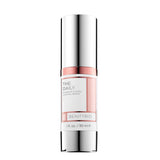THIS ARTICLE REFERENCES THESE PRODUCTS
If retinol rules our PM skincare routines helping correct damage while we sleep, its preventative AM counterpart is most definitely Vitamin C. But like the term “retinol,” Vitamin C is also an umbrella term used to cover a range of derivatives with varying degrees of potency and benefits. There are many Vitamin C facial cream benefits, but the fickle nature of Vitamin C causes it to lose stability once the skin absorbs it, or more accurately, it depends on whether your skin can absorb it. This is why it’s crucial to look for water-soluble (and preferably oxygen-stable and light-stable) forms of Vitamin C to ensure the powerful antioxidant doesn’t break down once it comes into contact with skin. These are the top 4 benefits of our daily routine staple plus forms of this powerful antioxidant we’ve discovered that work best.
Vitamin C prevents hyperpigmentation (aka discoloration)
We all have tyrosinase enzymes, which go through a process ultimately leading to melanin production. Melanin, not to be confused with melatonin, is responsible for our unique pigmentation, but an overproduction of melanin leads to the appearance of skin tone unevenness.
Vitamin C actually regulates that process of melanin production effectively preventing the formation of dark spots.
Brightens existing damage (pause and rewind)
Thanks to the above process, Vitamin C is also able to brighten and lighten, meaning it will help even out existing dark spots for a more even-toned complexion.
Helps with collagen (plumping up)
Vitamin C is important to collagen synthesis because it takes part in a process called hydroxylation, which is kind of like collagen strength training working to ensure our collagen is strong enough to support the epidermis.
The presence of collagen is important and helps to slow the formation of fine lines and wrinkles, always a bonus.
Vitamin C protects against free radicals (it’s an antioxidant, after all)
Free radicals originate from several sources - pollution, UV rays and second-hand smoke for example – and while Vitamin C isn’t a physical barrier to this damage, once these elements enter the skin, the antioxidant finds the atoms with only one electron (aka free radicals) and donates an electron to balance them out. Why do they only have one electron? Free radicals are the result of oxidative stress, which is caused by the environmental aggressors listed above. This neutralization process prevents free radicals from stealing electrons from healthy functioning atoms, which in turn staves off cell degradation.
There are 2 less volatile forms of Vitamin C that absorb much better
The most successful derivatives of Vitamin C at absorbing topically through skincare are
Sodium Ascorbyl Phosphate (SAP) and
Magnesium Ascorbyl Phosphate (MAP), however the more widely incorporated form is L-Ascorbic Acid, which is highly volatile and though rich in benefits, you can never be certain whether your skin will absorb enough to be effective.
These two forms ensure skin reaps the Vitamin C cream uses and benefits without the loss of efficacy over time.
SHOP THE STORY








